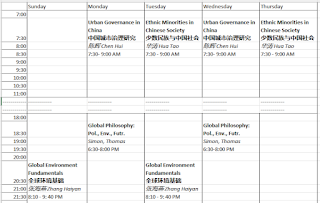Day in the Life of a HNC Certificate + SAIS MAIR Student
Every program at the Hopkins-Nanjing Center has its own special requirements, characteristics, and schedules. Certificate + MAIR student Eljoy Tanos gives us a rundown on a day in his life as a student at the HNC.
The HNC student body consists of a diverse pool of students with different academic backgrounds and expertise. In addition, students are attending the Hopkins-Nanjing Center under various programs. While many HNC students are a part of the two-year Master of Arts in International Studies (MAIS) program, there are also those in the one-year certificate program.
As a part of the Cert/MAIR program, I am attending the HNC as a certificate student for my first year before joining the DC program next fall. In this blog, I want to share how I created my Spring 2022 schedule for anyone who may be interested interested in joining Johns Hopkins SAIS in the future.
As a part of the Cert/MAIR program, I am attending the HNC as a certificate student for my first year before joining the DC program next fall. In this blog, I want to share how I created my Spring 2022 schedule for anyone who may be interested interested in joining Johns Hopkins SAIS in the future.
At the beginning of each semester, HNC students attend a meeting where professors pitch the courses they are teaching for the semester. The meeting allows students to learn about the content of the class, gauge the amount of workload for each course, and even get a first impression of each professor’s personality and lecturing style. I usually prepare a list of classes that interest me before the meeting. Then, during the introductions, I pay attention to each professor's speaking style and whether the content of the course still interests me. However, students do not solely choose classes based on their interests. Other factors that HNC students consider when making their schedule for the semester include class time, graduation requirements, and the future availability of a class.
Certificate Program RequirementCertificate students must take at least twelve credits (three full courses) per semester, for a total of twenty-four credits. Of the twenty-four credits (six full courses), twenty credits (five full courses) must be target-language courses. For international certificate students, this means that they must take no less than five courses taught in Chinese throughout their year in the certificate program.
Certificate + MAIR Student Requirement
My Spring 2022 Schedule
As an HNC student, the factors I considered when choosing classes for my schedule included:
1. Course title and past syllabus
2. Professor’s teaching style
3. Applicability to my graduation requirements
Since I plan to pursue a Johns Hopkins SAIS degree with a focus in environmental development and China, my first priorities were courses with a title relating to those two topics. I also looked at syllabi and student reviews from previous HNC students to help determine my choices. Then, I determined the lecture style of each professor from the introductory meeting that the HNC hosts at the beginning of every semester. Since I plan to have Development, Climate, and Sustainability (DCS) and China as my focus areas, I chose Urban Governance in China (中国城市治理研究), Ethnic Minorities in Chinese Society (少数民族与中国社会), and Global Philosophy as three of my classes this semester.
While I emphasized graduating on time and making sure that my credits apply towards the graduation requirements in this post, I also believe that this should not be a student’s only goal. Taking classes one can enjoy and exploring courses beyond one concentration are important parts of the HNC experience. For example, while taking Film, Culture, and Society in Contemporary China last semester, I made many friends with different interests and had a wonderful professor that gave me a broader perspective on the development of Chinese culture.
Being a part of the Hopkins-Nanjing Center community has helped me to deepen my understanding of previous topics I have studied while simultaneously expanding my knowledge of other sub-fields within international studies. By being at the HNC, I was able to meet students from different programs with different academic backgrounds and aspirations in life. While virtual learning has impeded our ability to physically learn together, students have continued to create ways to build a virtual community. For anyone interested in joining the HNC, I hope this blog helps you imagine how you would fit into the community as future fellow students and experts in Sino-American relations.





